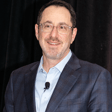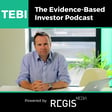Become a Creator today!Start creating today - Share your story with the world!
Start for free
00:00:00
00:00:01

Ep 35: Robin Wigglesworth on the extraordinary rise of indexing
Robin Powell’s guest on the latest episode of The TEBI Podcast is Robin Wigglesworth, global finance correspondent for the Financial Times.
Wigglesworth is the author of Trillions, a new book on the past, present and future of index investing. Currently living in Norway, he covers macroeconomics, finance, investing and markets internationally for the FT.
In this episode, Wigglesworth declares the active versus passive debate over, with passive the decisive victor. The only question now, he says, is just how dominant passive investing will become.
Transcript
Introduction and Context
00:00:04
Speaker
Hello and welcome to a special edition of the TEBI podcast from The Evidence-Based Investor. I'm Robin Powell and this podcast is produced by Regis Media, a niche provider of educational and marketing content for financial advice and planning firms.
ARK Innovation ETF Overview
00:00:21
Speaker
Now this episode is going to be short and sweet and will focus entirely on what frankly is turning out to be the fund industry's story of the year so far. And that of course,
00:00:34
Speaker
is the dreadful recent performance of the ARK Innovation ETF managed by Cathie Wood. Investment author and Tebi columnist Larry Suedro joins me now. Larry, please just start by giving us a very brief reminder, if you would, on who Cathie Wood is and what this fund invests in.
00:00:57
Speaker
Yeah. So Kathy Woods is now a legendary investor. She runs the AUG Innovation Fund among several funds. That's her lead fund. And
00:01:13
Speaker
She came to real attention in 2020 when her fund had spectacular returns was the number one performing fund. It was up like 150%. And that was the second time in the last year.
00:01:29
Speaker
Six years since her inception when she had finished in the first percentile. The previous time was her third year. And so money poured in as it always does as investors think they have found the next guru.
00:01:45
Speaker
And she went from just $200 million of assets after the first couple of years of very poor performance. The fund ratcheted up to $28 billion of assets at the peak in the first quarter of 2021. So that was how she came to everybody's attention.
Challenges Facing ARK Fund
00:02:09
Speaker
Of course, as so often happens, Larry, funds flow in when performance is good and then, you know, almost like clockwork, performance reverts to the mean and she has struggled, well, ever since February last year, hasn't she?
00:02:28
Speaker
She has struggled mightily. The fund lost last year something like my memory serves 27% but it was up significantly in the first six weeks. So it ended the year down from its peak more like 35% and is down over
00:02:51
Speaker
You know, another huge amount year to date and today is getting hammered again. Last time I looked this morning, the fund was down another 6% or so.
Market History and Investment Risks
00:03:03
Speaker
Wow. And today, by the way, whenever you're listening, is the 24th of January, Monday the 24th of January. So, Larry, you, of course, would be the first to say that investors should focus on the long term. But AHRQ's very recent performance has been, well, really quite alarming for investors in this fund.
00:03:32
Speaker
what happened briefly on Friday and what's been happening again today.
00:03:38
Speaker
Well, I think it's best to describe the general situation rather than just look at Cathie Wood's situation. What we want to look at is the history of markets, because then we can learn that there's nothing really unusual going on here. That's what's important. We've been there and done that. And the history of investing is that
00:04:07
Speaker
Investors, the evidence shows, should not hold stocks that have very high prices to book value, to dividends, earnings, especially when those high prices are correlated with high trading volume, meaning there's a lot of investor sentiment.
00:04:25
Speaker
what are called noise traders who aren't really trading on fundamentals are there. There also tends to be a low share supply and lots of buzz in the media. When you get that, you should really be thinking to run away, not chase those returns. And that's what happened in March of 2001, you know, the whole dot com bubble blew up. And now I think we're seeing the same thing now.
Effects of Noise Trading and Market Collapse
00:04:53
Speaker
It's not just Kathy Woods.
00:04:54
Speaker
something like almost half the stocks in the NASDAQ are down 50% or more from their highs, even though the markets haven't really crashed. The S&P is down 10% or so for the year. So it's kind of like a repeat. So we've been there before, which is why one of my favorite expressions is the only thing you don't know about investing is the investment history you don't know.
00:05:22
Speaker
So Robin, here's the message. Here's what happens and why these things blow up. People are investing in these things that are not for fundamental reasons. It's noise chasing the latest returns. And if you don't have a fundamental belief system,
00:05:39
Speaker
When things start to go bad, the risks show up, you don't have the decimal to stay the course. So here's what happens. Stocks start to go down as the bubble starts to burst, the air gets let out. Maybe it's some economic event like the Fed starting to tighten, or it could be just the end of a bubble with no news happening.
00:06:03
Speaker
And then the stocks start to drop. And maybe when you get to about a 10 percent drop, some people start to panic and sell. They can't take the pressure anymore. They can't sleep at night. And that pushes prices down even further until the next person reaches what I call their GMO point, where their stomach is screaming, get me out. And then they sell.
00:06:28
Speaker
And then you get people who are on margin who are forced to sell, even if they want to stay, they sell and that pushes the next GMO point. And this thing just spirals in a vicious circle until prices finally collapse so much that they're now stocks are trading at their fundamental values. That's the history. That's what always happens.
00:06:51
Speaker
Got you.
Short Selling and Market Dynamics
00:06:52
Speaker
As you say, Larry, it's more than just Cathie Wood's fund. I mean, technology stocks across the board have been affected recently. You were saying that Nasdaq stocks down some of them around 50%. About half of the stocks in the Nasdaq are down about 40%, 50% or more.
00:07:14
Speaker
Well, nevertheless, there does seem to be a particular targeting, if you like, by short sellers of the ARK Innovation Fund. Is that what's going on here?
00:07:30
Speaker
I think it's much more likely that this is margin selling and the panic recency and you get momentum traders piling in now and so you will get some shorting and when you short you borrow the stock and then sell it because you hope to buy it back later so you're adding more selling pressure and
00:07:53
Speaker
The stocks you tend to own have tended to be less liquid stocks, which are targets then. They get driven up by the Reddit crowd, and then when their fundamentals don't show up and you get any bad news,
00:08:08
Speaker
That crowd then panics and sells because there's no fundamental reasons for the stocks to have been there in the first place. The one other thing I would add is I think the lessons learned from the GameStop episode are playing out in that the lesson is this.
00:08:27
Speaker
you now have the ability for retail investors to gang up legally and attack short sellers in illiquid stocks. So short sellers are really important to the market. They help keep market prices rational because otherwise you only get people who are optimists
00:08:51
Speaker
uh you know uh controlling prices and driving them up but if you know you could be the target of this crowd uh then you're not likely to engage in short selling or less likely because of the risk that you're right in the long term but dead uh like is what happened with GameStop
00:09:11
Speaker
Interesting.
00:09:29
Speaker
This does seem to be another disadvantage, Larry, of using active funds. To stand a chance of outperforming after costs, you have to use a high conviction manager like Cathie Wood. But of course, high conviction managers and especially high profile ones like her are prime targets for short sellers, aren't they?
00:09:52
Speaker
if they're in illiquid stocks, certainly, but it occurs because you get the sentiment driving those prices, the values that never make sense. What investors should really learn is Kathy Woods is not unusual.
Luck vs. Skill in Investing
00:10:07
Speaker
We don't know whether she was a genius who was unlucky, or she just got lucky was one and happened to hit it right. But what we do know
00:10:16
Speaker
is that there have been many Cathie Woods in every decade. In the 70s, Peter Lynch was the most famous investor at spectacular returns, but he wasn't the best performing fund, Magellan. It was something called 44 Wall Street. It had the Cathie Woods of her day running the fund. And the next decade,
00:10:39
Speaker
That fund, which outperformed Magellan, turned $1 into 27 cents during the decade. That was probably the strongest period for stocks ever. That was that, Cathie Woods. Bill Miller, another legendary investor who beat the S&P, set a record for more years in a row than ever was done. And then from, I think, something like 206 or whatever on, his performance was terrible.
00:11:08
Speaker
You know, the problem is investors don't understand that with over 10,000 people managing funds randomly, you're going to get somebody who is high conviction, getting it right either out of wisdom or a lot. But then, you know, we don't know if it was skill or luck. And the evidence says it's much more likely to have been locked in skill, because we almost never see repeat performances.
00:11:36
Speaker
Larry, I know you're not a fan, to say the least, of CNBC.
Assessing Market Risks and Predictions
00:11:42
Speaker
In fact, you urge investors to kind of turn off financial television, if at all possible. And same applies to me. I guess, though, if we were to be watching it right now, that they would be asking whether global markets generally are in a crash situation.
00:12:06
Speaker
And last week, for example, the legendary investor Jeremy Grantham warned that stocks are in a super bubble. He was saying that once interest rates return to normal and what he calls realism returns to an overzealous market, the bubble will pop. I mean, maybe it already has popped. What are your thoughts on that, Larry?
00:12:32
Speaker
Yeah, well, first, I'm nothing against CNBC, you just have to understand they're in the bill is business of selling noise, not knowledge, they need you to tune in. So they sell what people want to hear in terms of the noise.
00:12:49
Speaker
You know, they also have people like Bert Malkiel and had John Bogle and I've appeared on CNBC before. So you have to understand what you're listening to and you want to tune out the noise and get the historical information about what is likely to prove to be the winning strategy. With that said, let's attack the Jeremy Grantham story.
00:13:16
Speaker
You know, if you cried bare markets long enough, eventually you'll be right like a broken clock, which is right twice a day. Jeremy Grantham in 2013, and I wrote up a piece about this, said the market was 60 to 70% overvalued, and we were to have a crash, and the market had one of its best years ever.
00:13:37
Speaker
ever went on to have a spectacular decade only interrupted by the COVID crisis. And throughout the entire eight years, Grantham was screaming that the markets were overvalued. Here, what I would say to investors is US stocks
00:13:55
Speaker
At least when it comes to the large cap and other growth stocks like the kind Kathy Woods was buying, they are highly valued and were certainly subject to the potential risk of a crash. But the rest of the market, the value stocks, for example,
00:14:15
Speaker
are about trading at their historical averages, maybe even cheaper, and they're not in a bubble in any way. In the same way the market crashed in 2000 in March, it was not the overall market that crashed, but the high-flying growth stocks, value stocks tended to do okay, maybe dragged down a bit.
00:14:38
Speaker
And we have the same situation in the rest of the world. We have valuations in the developed world that XUS and emerging markets are about their historical valuations, despite the fact that interest rates are still zero, and that would support even higher valuations.
00:14:58
Speaker
I don't think we're in a bubble. Could a crash happen? Sure. There are lots of potential risks out there. You have Russia, Iran, China with Taiwan, Fed tightening maybe having to tighten more, but it won't be because I think the market is overvalued, except in the area where we've already seen this crash.
00:15:22
Speaker
So, Larry, I promised at the beginning that this would be brief. I have one more question for you.
Investment Advice for ARK Investors
00:15:28
Speaker
When I spoke to you about this a couple of weeks ago, you said that the best thing, frankly, that investors in the ARK Fund could do would be to sell it. And of course, if people actually taken your advice, they would actually be better off than they are today. What would be your advice to ARK Fund investors now?
00:15:50
Speaker
Well, my advice would be to ask yourself this question. Knowing what you now know, and if let's say you add $100,000 invested in ARC funds, and instead you add $100,000 in cash, would you buy
00:16:11
Speaker
that particular fund, or would you invest it in some other way? If the answer is you wouldn't buy it, then the answer is obvious. What you should do is sell it, because every day you're holding it, you're making the decision to buy it. And that should be the way you think about everything you own every day. If you wouldn't buy it today, then you should sell it, although, of course, taxes have to be a consideration. But I would add this.
00:16:40
Speaker
Even though Cathie Wood's fund since inception has still had good returns, the average investor has significant losses because they bought at the high prices on average well above where the price is today.
00:16:57
Speaker
Exactly. And we see this over and over again. Larry Suedro, thank you so much for your time. You've been listening to me, Robin Powell, interviewing Larry Suedro on the Tebbe podcast. If you've enjoyed this episode, please subscribe. In fact, why not click like, or even better, write a review. Thank you to Regis Media for producing and funding this podcast. Thank you to Larry and to you for listening. Until next time. Goodbye.
















